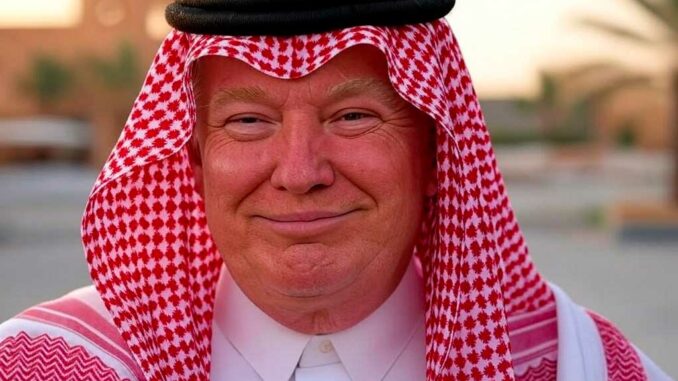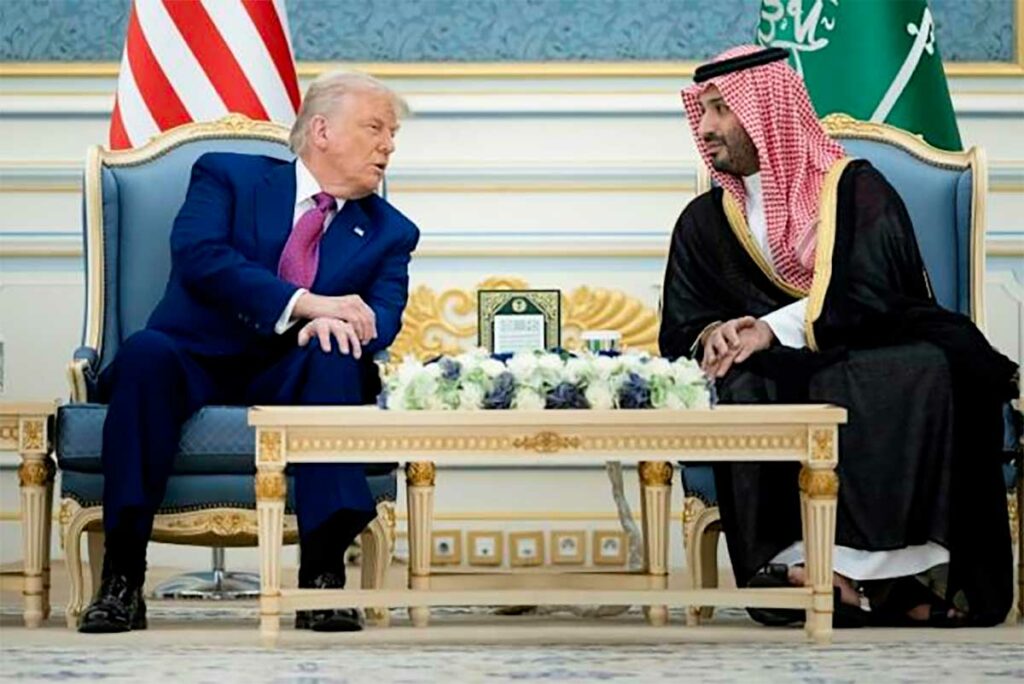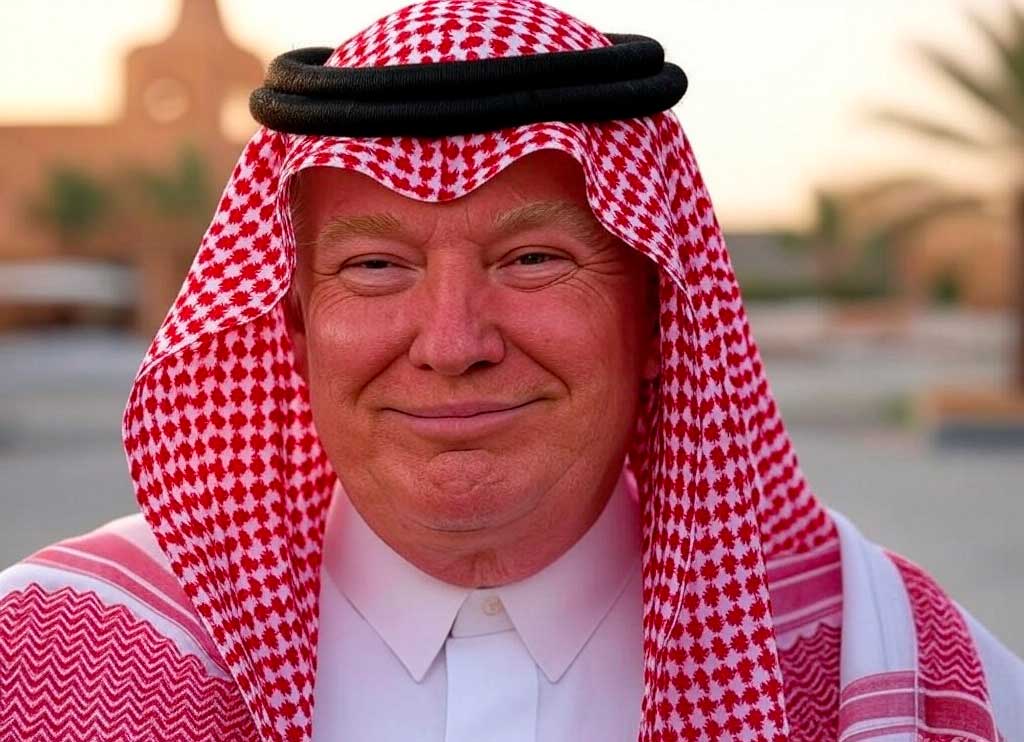
Donald Trump seals more than €700 billion in deals during a strategic tour of the Gulf, focused on investment and arms.
Donald Trump’s second presidential trip abroad began with a highly symbolic stop in the Gulf, in Saudi Arabia, Qatar, and then the United Arab Emirates. Far from traditional Western partners, this targeted visit resulted in massive trade and military agreements totaling nearly $750 billion, more than half of which have been contracted or announced. At the heart of the discussions were technology, artificial intelligence, energy, armaments, and the Gulf countries’ desire to strengthen their economic and diplomatic influence with Washington. But behind the figures, questions remain about the real strength of these commitments, the role of the private sector linked to the Trump family, and the geopolitical implications of such a rapprochement.

A political shift guided by economic pragmatism
By choosing Riyadh as the first stop on his tour, Donald Trump is prioritizing the security of trade agreements over traditional diplomacy. He is thus departing from his predecessors by avoiding European and Asian capitals in order to address authoritarian regimes with colossal financial resources directly.
This approach reveals an unapologetic transactional logic. The three countries visited—Saudi Arabia, Qatar, and the United Arab Emirates—together manage more than $3 trillion in sovereign wealth funds. These states also have historical ties to the United States through major military partnerships: Qatar is home to the largest US military base in the Middle East, Al Udeid, while Saudi Arabia is a regular customer of the US defense industry.
Trump’s statements, such as “They only put in a trillion dollars,” sum up the heart of the trip: to show a direct relationship between massive investments and diplomatic support. The message is clear: the more generous the agreements, the more valuable the bilateral relationship. This stance, criticized by some observers for its brutally utilitarian nature, nevertheless appeals to partners seeking a stable relationship that is largely unaffected by human rights issues or changes in the US administration.
Massive but sometimes vague trade agreements
The figures announced and the reality
According to the White House, nearly $600 billion (approximately €552 billion) in agreements were announced, divided between the arms, artificial intelligence, energy, and aviation sectors. However, official documents show that agreements worth between $275 billion and $300 billion have actually been signed, which is around half the amount announced.
For example:
- Saudi Arabia: $142 billion in arms, or around €130 billion.
- Qatar: more than $243 billion announced, including the purchase of 210 Boeing aircraft, a contract described as the largest ever signed by the US company in commercial aviation.
- United Arab Emirates: $200 billion in trade agreements, mainly in energy, defense, and technology.
Commitments were also made by Gulf sovereign wealth funds, notably the Qatar Investment Authority (US$450 billion in assets), which plans to invest US$500 billion in the United States over ten years. The Emirates, for their part, have announced a package of $1.4 trillion (€1.29 trillion) over the same period.
These amounts are not always accompanied by precise timetables or publicly available contractual clauses. In other words, announcements sometimes take precedence over budgetary discipline.
The strategic role of investment in artificial intelligence and energy
The Gulf countries are seeking to diversify their economies in anticipation of a gradual decline in oil revenues. Artificial intelligence, cybersecurity, cloud computing, and energy infrastructure are among the sectors identified as priorities. These areas are also target sectors for investment in the US economy.
For example, Saudi Arabia, as part of its Vision 2030 program, plans to invest more than €200 billion in energy transition and digital technologies. Trump’s visit helped link these local ambitions to high value-added US partnerships, particularly around cloud projects with Microsoft and Google, as well as cybersecurity partnerships.
The economic benefits for the US are significant. An aerospace contract such as the one signed with Qatar represents tens of thousands of direct and indirect jobs for Boeing and its subcontractors in the US. In return, the Gulf countries are consolidating their position as strategic customers and financiers of the US technology economy.

Political implications and controversies surrounding the Trump family
The presidential trip was not without criticism regarding family ties. A few days before the tour, the Trump Organization, led by Eric Trump, opened a hotel in Dubai and signed a real estate contract with an entity linked to the Qatari state. Although legal, these transactions raise questions about the mixing of public and private interests, a topic that was already debated during Donald Trump’s first term.
In addition, Qatar’s offer to provide a luxury jumbo jet to temporarily replace Air Force One was interpreted as a state gift with political motives. Although this offer was not officially mentioned during the tour, it reinforces the perception of an ambivalent relationship between public power and private enrichment.
These events raise questions about the ability of US institutions to manage conflicts of interest abroad, especially when hundreds of billions of euros are at stake.
Geopolitical consequences and lack of diplomatic debate
The trip took place against a backdrop of ongoing regional tensions, particularly over the war in Gaza, which Trump virtually ignored, despite public calls from the Emir of Qatar to intervene to promote peace. This silence on humanitarian issues contrasts with the centrality of investment in the official discourse.
Furthermore, the surprise announcement of the lifting of US sanctions against Syria following a meeting with President Ahmed al-Sharaa, a former Islamist rebel leader, raises questions about the concessions negotiated behind the scenes. This change of policy towards Damascus, without consultation with NATO partners or international institutions, weakens the US diplomatic position on the Syrian issue.
The medium-term consequences could include a consolidation of checkbook diplomacy at the expense of more traditional multilateralism. This transactional model risks reducing the space for negotiation on human rights, armed conflict, and climate change.
A shift revealing a contractual diplomacy
Donald Trump’s tour of the Gulf highlights a contractual and bilateral diplomacy focused on immediate economic interests. By highlighting colossal agreements that are often symbolic, the US president has sought to reinforce his image as an effective negotiator, while bypassing the traditional arenas of Western diplomacy.
Even if only 50% of the announced amounts materialize, this represents considerable financial flows between the United States and the Gulf. But the weakness of the political quid pro quo, the opacity of some contracts, and the potential involvement of private family networks raise real questions about the governance of international relations in the era of transactional economics.
War Wings Daily is an independant magazine.